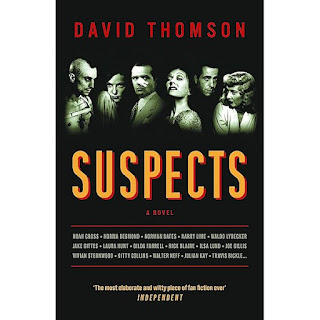EDITORIAL
Mike Williams talks about Moviedrome, a series of late night cult films shown on BBC2. (These days you have to explore channels such as Talking Pictures or TPTV - today showing Genevieve, one of my earliest films from 1953). He also looks other old TV series such as "Scene By Scene" 1997-2003 where Mark Cousins talks to actors and directors - see IMDB. These kinds of programmes are now mainly on Sky Arts.
OPENING SCENES
A preview of the London Film Festival 9-20 October. Amongst the many new films are Steve McQueen's Blitz showing London being bombed in WW2, the winner of the Palme D'Or Amora and Pedro Almodóvar's first English language film The Room Next Door. Sound great. Also short reviews for eight mainly foreign films that may not even get a national release.
EDITOR'S CHOICE
Of the six books and features described, I was only interested in a new book about Mary C McCall Jr, a screenwriter from the 1940's and early 50's. Subtitled The Rise and Fall of Hollywood's Most Powerful Screenwriter. But then a mention for a YouTube video about a cult video game and how it was filmed being created over a number of years. See Double Fine PsychOdyssey.
Skipping past a few articles, I arrived at a very long
OBITUARY
Gena Rowlands 1930-2024 worked as an actress in the golden age of Hollywood. She won a Golden Globe twice and her films include 1977's Opening Night (looks interesting), A Woman Under the Influence and Gloria.
TALKIES
THE MAGNIFICENT '74
I just love these four full page articles in the Talkies section by the regular contributors. In this first one, Jessica Kiange is in thrall to director Roberts Altman's Thieves Like Us from that year, (1974). She particularly like Shelley Duval in this adaptation of Edward Anderson's novel set in 1937. The director had the previous year released The Long Goodbye. But this time he had "perhaps the softest boiled crime movie ever made". We'll see.
FLICK LIT
Nicole Flattery starts by looking at the new film Blink Twice and then Saltburn just for the sets that say something about the rich. But I was not sure what this had to do with Alan Hollinghurst's book The Line of Beauty. I noted in my review of 17th March 2013 that it had so little plot. Maybe that is why it was only made into a TV series and never a feature film. I hope next time there is a comparison of like with like.
TV EYE
It's Emily Nussbaum's new book Cue The Sun!: The Invention of Reality TV that is the basis of Andrew Male's discussion about ...... reality TV programmes. From early series such as Candid Camera to modern day such as The Apprentice and lots in between. But I had not heard of Alone where contestants film themselves in solitude. More recent shows are maybe turning the tide from cruelty?
THE LONG TAKE
Pamela Hutchinson describes a scene from the Oscar winning film Picnic (Joshua Logan 1955) starring Kim Novak in her first role for Columbia Studios. For Pamelas' beautiful example of Hollywood film making, she nominates "four sublime minutes ..... in the "Moonglow" sequence where something special happens". It involves a dance sequence with Novak and William Holden. Pamela tells us about everything that went into making this brilliant. The film was nominated for six Oscars and won two. "It was bliss while it lasted". It make Kim a star. The music, costumes, cinematography and choreography were all first rate. Pamela's beautiful last paragraph says it all: "In this glorious union of music, and colour, movement and meaning, it takes two to tango, and a whole studio to trip the light fantastic".
(I watched it on YouTube: "Morris Stoloff - Moonglow and the theme from Picnic". Novak's entrance is something to behold, her movement would make any man fall in love.)
CALIFORNIA DREAMER
A major article on Francis Ford Coppola (gracing the front cover) who, at 85 years old, has brought us his dream project Megalopolis. Looking at the trailer, it's the visuals that impress. But does it have a story? Tom Charity in his article refers to it being "jumbled, incoherent". But his article is mainly about the director's earlier works. His interview with Coppola is just that, together with his background. But best of all are some stills from this new movie and others. The best of all is that picture from The Conversation with Gene Hackman. There are mentions for other film makers including bits on Tangerine, One from the Heart (1981) and this year's Reprise. At the end of this section, there are two ages describing six of the director's movies, mostly familiar. Maybe just The Outsiders looks interesting.
SO RETRO: WHY MODERN HORROR IS IN THRALL TO THE PAST
It is Roger Luckhurst who is telling us about recent horror films: I Saw the TV Glow, Long Legs, Maxxxine, The Black Phone and Starve Acre. Most of these I could not watch these days, but Long Legs is not really a horror, more a clever serial killer movie. The writer compares these modern films with previous decades. He picks out our obsession with British folk horror from The Wicker Man and Blood on Satan's Claw to Midsomer and the latest Starve Acre. Looking at movies pre-digital and set in the 1970's. he mentions "Anna Biller's impressive act of devotion: The Love Witch". Looks fun. There are mentions for the usual suspects: 1968's Night of the Living Dead, The Texas Chainsaw Massacre from 1974 and The Omen franchise.
"BEHIND THE PERFECT SMILE, THERE IS A WORLD INSIDE THAT IS VIOLENT"
Catherine Wheatley describes the "bonker's body horror" that is The Substance. This is the subject of French director Coralie Fargeat's brand new movie: " a masterclass in narrative exposition in it's first wordless five minutes". Elizabeth Sperkle (Demi Moore) has experimented with this drug that has unexpected consequences. So when Margaret Qualley's entrance is explained, OMG. The film has ageing as a theme so a surrealist horror. (Good long review in the Sunday Times today).
A SPECIAL RELATIONSHIP: MARTIN SCORSESE AND EDGAR WRIGHT ON BRITISH CINEMA
So with the long piece on Francis Ford Coppola and now MS, we get two for the price of one. Here we are in the Pandemic when Edgar Wright wrote to Martin about his views on lesser known British films. What follows is a mammoth article that is their correspondence at the time. From Powell and Pressburger, to Hitchcock, Carol Reed and all sorts of movies I had never heard of. For example, there is a full page still from 1945's film The Seventh Veil. The two leads are James Mason and ...... Ann Todd. Scorses says "she's so great in that, her face, her eyes. She's so beautiful. She's a wonderful character". (I met her once when I was maybe ten or eleven. She lived near Holland Park and frequented the grocers that my father managed at the time. So we were invited to meet her). There are so many other films they discussed, but two caught my eye. The Man in the Sky from 1957 is an Ealing Studios film that stars Jack Hawkins where, we are told, the editing is something else. And Hue and Cry from 1947.
REVIEWS
FILMS
Of the many new films reviewed here, I have just picked out a few. In Firebrand, Alicia Vicander's praised performance as Catherine Parr would be the only reason I would want to see another Henry V111 movie. The Outrun is about rehab in The Orkneys but it does have Saoirse Ronan in the lead role. The French production follow up to the two films of The Three Musketeers (see my reviews - the third in the trilogy seems to have been forgotten) is, predictably, The Count of Monte Cristo. But at very nearly three hours is too long for me. For Alien: Romulus see my review. For The Substance see above. Then Starve Acre sounds gruelling but might be interesting. Could be too much horror? but Tessa Ross is a producer. A Different Man sounds like a discomforting story, but a reasonable plot. Kate Winslet's Lee is a big production.
REVIEWS IN BRIEF
Only very brief reviews for It Ends With Us and Trap, both reviewed on this blog.
DVD & BLU-RAY
Laurel and Hardy: The Silent Years". Fifteen films in this collection. But not for me or the others reviewed.
WIDER SCREEN - BOOKS
MISS MAY DOES NOT EXIST: The Life and Work of Elaine May, Hollywood's Hidden Genius by Carrie Courogen. Nothing like a hard sell. See post of 23rd April 2024.
ARMCHAIR CINEMA: A History of Feature Films on British Television 1929 - 1981 by Sheldon Hall. Look out for reviews.
FROM THE ARCHIVE
A five page article on Sergei Eisenstein.
ENDINGS
An article about Asghar Farhadi's superb 2016 film The Salesman. It won the Oscar for best film in a foreign language. " A high end production of the play "Death of a Salesman" where the leading actors are in big rouble". Make up for the actors plays a big part but it is mainly about their relationship during the run. I loved it. See post of 3rd August 2020.


















































